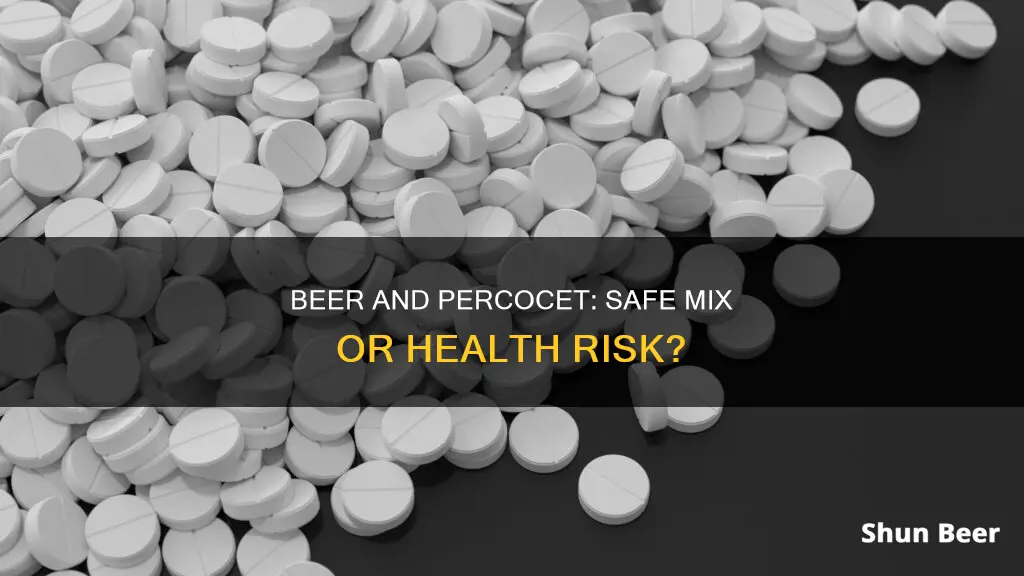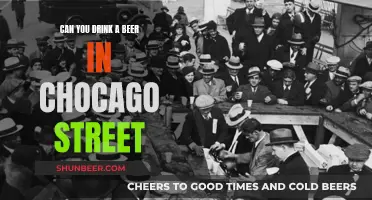
Mixing alcohol with prescription drugs can be dangerous, and non-alcoholic beer is still an alcoholic drink. While non-alcoholic beer has a low alcohol content, it can still be unsafe to consume when taking prescription drugs such as Percocet. It is important to understand the risks associated with mixing any amount of alcohol with medications.
| Characteristics | Values |
|---|---|
| Mixing non-alcoholic beer with Percocet | Dangerous |
| Reason | Non-alcoholic beer contains alcohol, which when mixed with Percocet can lead to severe respiratory depression, slowed heart rate, liver damage, overdose, and even death. |
What You'll Learn

Mixing alcohol and Percocet can be lethal
Percocet is a prescription pain-relieving drug that combines oxycodone, a semi-synthetic opioid, with acetaminophen, a non-opioid pain reliever. Oxycodone is highly addictive, and both oxycodone and acetaminophen can be toxic to the liver. Alcohol is also a central nervous system depressant, and when mixed with Percocet, the effects of both substances are amplified.
Mixing alcohol and Percocet can cause profound sedation, decreased heart rate and blood pressure, slowed or stopped breathing, unconsciousness, coma, and death. The combination can result in irreversible liver damage and increase the risk of an opioid overdose. The risk of an overdose varies from person to person, and there is no way to know how much alcohol and Percocet it takes for an overdose to occur.
The side effects of mixing alcohol and Percocet include impaired judgment and coordination, irregular heart rate, and loss of consciousness. Mixing these substances can also increase the risk of addiction, as both alcohol and oxycodone induce a sense of relaxation and euphoria. The combination can make it difficult to remember the last dose of medication, leading to overuse of both substances.
It is important to note that even if you no longer feel the effects of Percocet, it does not mean that it is safe to consume alcohol. Oxycodone has a drug half-life of around 4.5 hours, and it can take much longer to eliminate it from your system. Similarly, alcohol can be detected in the blood up to 12 hours after consumption, so it is unwise to take Percocet after drinking.
Low-Carb Beer and Keto: What's the Verdict?
You may want to see also

Combining the two can cause irreversible liver damage
Combining non-alcoholic beer and Percocet can cause irreversible liver damage. This is because Percocet contains acetaminophen, which is toxic to the liver when consumed in high doses. When alcohol is added to the mix, the potential for hepatotoxicity (liver poisoning) increases. This is due to the competition for the enzyme CYP2E1, which breaks down both alcohol and acetaminophen. As a result, less acetaminophen is broken down and more of the drug remains in the bloodstream, increasing the risk of liver injury and permanent liver damage.
The combination of non-alcoholic beer and Percocet can also lead to other serious health risks. Both alcohol and oxycodone, one of the active ingredients in Percocet, are central nervous system (CNS) depressants that slow down breathing and heart rate. When combined, they can cause profound sedation, decreased heart rate and blood pressure, slowed or stopped breathing, unconsciousness, coma, and even death.
In addition, mixing non-alcoholic beer and Percocet can increase the risk of addiction and overdose. Alcohol and oxycodone both stimulate the production of "feel-good" hormones, such as dopamine and serotonin, which can make users feel more relaxed and happy. However, over time, the brain's reward center becomes less responsive to these drugs, leading to drug tolerance and the need for higher doses to achieve the same effects. This can increase the risk of addiction and overdose, especially if people forget they have taken a Percocet dose and take another one.
To avoid these serious health risks, it is important to refrain from consuming non-alcoholic beer while taking Percocet. Percocet is typically prescribed for short-term use, usually no longer than five days, so it is recommended to simply cut out alcohol until at least 24 hours after stopping treatment.
The side effects of mixing non-alcoholic beer and Percocet can be dangerous and should not be taken lightly. Combining the two substances can lead to irreversible liver damage, increased risk of addiction and overdose, impaired coordination and judgment, and a higher risk of injury.
Louisiana Public Parks: Drinking Beer, What's Allowed?
You may want to see also

It can also increase the risk of opioid overdose
Mixing non-alcoholic beer with Percocet can increase the risk of an opioid overdose. This is because both non-alcoholic beer and Percocet can slow breathing, impair judgment and coordination, and be toxic to the liver. The combination of the two can amplify these effects, increasing the risk of injury, especially if driving a car.
Oxycodone, the opioid in Percocet, is a central nervous system (CNS) depressant, which has a similar effect on the brain as alcohol. Oxycodone and alcohol both slow the brain's neural pathways, making it harder for the brain to coordinate functions like balance, memory, speech, and judgment. This can lead to unsteady walking, blurred vision, slurred speech, slowed reaction times, and impaired memory and judgment. Taking them together can make you "drunker" than you might be from drinking alcohol alone or "higher" than you might be from taking oxycodone alone.
The combination of alcohol and Percocet can also increase the risk of addiction. Alcohol use has been shown to increase the likelihood and effects of opioid addiction, and people who abuse both alcohol and opioids are less likely to respond to substance abuse treatment.
In addition, the potential for hepatotoxicity (liver poisoning) increases when alcohol is added to the mix. This is because the enzyme that breaks down acetaminophen, one of the components of Percocet, also breaks down alcohol. As a result, less acetaminophen is broken down, and more of the active drug remains in the bloodstream, increasing the risk of liver injury and, in some cases, permanent liver damage.
The combination of alcohol and oxycodone can also be lethal. It can lead to respiratory depression, a condition characterized by minimal or no breathing, which can quickly cause brain damage and death if left untreated. Even drinking a moderate amount of alcohol along with taking just one oxycodone pill is enough to risk respiratory depression. The elderly are most vulnerable to a fatal oxycodone overdose after drinking alcohol.
Therefore, it is essential to avoid mixing non-alcoholic beer with Percocet to reduce the risk of opioid overdose and other dangerous side effects.
Mixing Beer and Wine: A Night of Fun or Disaster?
You may want to see also

Mixing alcohol and Percocet can suppress the central nervous system
When alcohol and Percocet are combined, the CNS-depressing effects of each are amplified. This can result in decreased heart rate and blood pressure, slowed or stopped breathing, unconsciousness, coma, and even death. The risk of respiratory depression, or slowed breathing, increases exponentially when alcohol is used in combination with opioids like oxycodone. This can lead to irregular, shallow, or stopped breathing, which, without immediate medical treatment, can quickly result in fatal brain injury.
In addition to the CNS-depressing effects of alcohol and oxycodone, the other main ingredient in Percocet, acetaminophen, also poses risks when mixed with alcohol. Acetaminophen is known to be hepatotoxic, or toxic to the liver, and this risk is increased when combined with alcohol. The liver struggles to metabolize both substances at the same time, and hepatoxic metabolites and oxidative stress build up, increasing the risk of liver damage. This combination can even cause irreversible liver damage if consumed excessively or over a long period of time.
Given these serious risks, it is clear that mixing alcohol and Percocet can have severe consequences and should be avoided.
Liquid Diets and Beer: Is It Allowed?
You may want to see also

It can lead to slowed breathing, impaired judgment and coordination
Mixing alcohol and Percocet can be extremely dangerous and can lead to slowed breathing, impaired judgment, and coordination.
Percocet is a prescription opioid painkiller that combines oxycodone and acetaminophen. Oxycodone is an opioid that activates specific receptors in the brain to modify pain sensations and trigger a cascade of biochemical processes associated with pleasurable feelings. On its own, oxycodone can cause slowed breathing. Meanwhile, alcohol is a central nervous system depressant that slows down various bodily functions, including breathing and heart rate.
When alcohol and Percocet are mixed, they can result in profound sedation, decreased heart rate and blood pressure, slowed or stopped breathing, unconsciousness, coma, and even death. The combination of these substances can overwhelm the respiratory system, leading to irregular, shallow, or stopped breathing. This can quickly lead to brain injury and death if left untreated.
In addition to the risk of slowed breathing, mixing alcohol and Percocet can also impair judgment and coordination. Both alcohol and oxycodone slow down the brain's neural pathways, making it harder for the brain to coordinate functions like balance, memory, speech, and judgment. This can lead to blurred vision, slurred speech, slowed reaction times, and impaired memory and judgment.
The combination of alcohol and Percocet can amplify these effects, making individuals more intoxicated and impaired than they would be from drinking alcohol or taking oxycodone alone. This increased impairment can lead to a higher risk of injury, especially if operating a vehicle or heavy machinery.
The dangers of mixing alcohol and Percocet are significant, and it is crucial to avoid combining these substances to prevent severe respiratory depression and other life-threatening complications.
Beer and Army Uniforms: What's the Official Stance?
You may want to see also
Frequently asked questions
No, you should not drink non-alcoholic beer while on Percocet. Both non-alcoholic beer and Percocet can slow down your breathing, and the combination of the two can be dangerous and lead to severe respiratory depression, which could result in irreversible injury and/or death.
Mixing non-alcoholic beer with Percocet can result in profound sedation, decreased heart rate and blood pressure, slowed or stopped breathing, unconsciousness, coma, and potential death.
If you or someone you know is struggling with addiction, it may be time to seek professional help. You can contact the Substance Abuse and Mental Health Services Administration (SAMHSA) National Helpline at 1-800-662-4357 for support and treatment facilities in your area.







